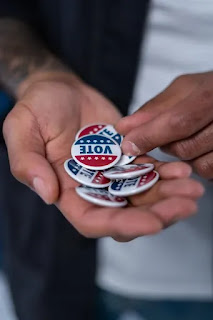A Theology of Voting
Election season in the U.S. feels like riding a rollercoaster you didn’t want to get on, and one that you can’t get off of. It is full of stomach-churning twists and turns. For immigrants, people of Color, and anyone who’s lived on the margins, the stakes feel sky-high. Politicians on every side tell us that if “the other guy” wins, life as we know it will collapse. And honestly, it’s hard not to feel that way sometimes. This is a country divided by ideologies that seem to tear at the heart of humanity.
The Apostle Paul offers wisdom here, especially for times
like these: "Let no corrupt communication proceed out of your mouth, but
only what is good for necessary edification, that it may impart grace to the
hearers" (Ephesians 4:29). Grace in politics seems rare, doesn’t it?
Instead, accusations and insults fly. Each side declares itself the “true”
keeper of American values, while casting the other as evil or, at the very
least, foolish. This tactic isn’t new. We’ve been here before—whether with
immigrants, communities of Color, the poor, or any group that doesn’t fit into
the mainstream’s tidy boxes.
I am seeing politicians play to fears, painting groups as threats to a “way of life” that, for many of us, has never existed. For those of us who know the feeling of otherness, we understand that the “way of life” often lauded as sacred is the very life that has overlooked, marginalized, or outright oppressed us. And yet, I can’t help but wonder if there’s another way. Jesus himself looked at a divided society, a world marked by us-versus-them thinking, and He broke that mold by choosing compassion over accusation, sacrifice over self-interest.
Methodism has always held the tension between personal and
social holiness. In the words of John Wesley, “Though we may not think alike,
may we not love alike?” Wesley knew the kind of divisions we see today. To be
clear, Wesley did not grow up or live in a fully democratic society. England
was governed by the Monarchy and those who were eligible to vote were White
males over 21 who owned property. That represented a smaller portion of English
society which made Wesley part of the larger society which would not be
eligible to vote. This is almost unimaginable!
Yet! In the last recorded letter that Wesley wrote was to
William Wilberforce in February of 1791 during the time Wilberforce fought to
outlaw the slave trade. In the letter, Wesley stated, “Go on, in the name of
God and the power of his might, till even American slavery (the vilest that
ever saw the sun) shall vanish before it.” Though one may think (including me)
that Wesley would not have had a strong grip on understanding this American
idea of democracy, he understood what decency in the political public square
was about. I am going to take the liberty to posit that Wesley would have voted
against Project 2025. He would have abhorred the way that politicians and their
supporters want to expand on the lie of white supremacy, and the dehumanizing
of people groups.
The more I think about this election season, the more I’m
reminded of a line from J.K. Rowling’s Harry Potter and the Goblet of Fire:
“We are only as strong as we are united, as weak as we are divided.” Division
breeds fear, and fear convinces us to see each other as enemies. When political
leaders lean into that division, they’re stoking flames that harm us all. But
when we hold firm to unity and common purpose, we remind ourselves that our
strength lies in seeing each other’s humanity, instead of seeing our
differences.
John Wesley’s example speaks directly into this moment. He cared about the marginalized, the poor, the oppressed, and he consistently challenged the powerful structures of his time that perpetuated injustice. Wesley wouldn’t have turned a blind eye to the suffering caused by policies that disregard the vulnerable or deepen inequality. He would remind us that true strength doesn’t come from the label of “right” or “left” but from a commitment to righteousness, which calls us to defend those who are most impacted by these divides. Wesley’s voice would call us not to entrench ourselves in partisan battles but to seek solutions that uplift those who feel abandoned and discarded by the system. Even as people clamor for vitriol and hatred, there is a deeper hunger for decency.
So, as you head to the polls (if you haven’t already), hold on to a vision that reaches beyond fear. Cast your votes with a heart for justice and a mind for mercy. Rev. Wesley would urge us to challenge unjust systems, and he would also remind us that politics should never take precedence over people. Vote against fear. And remember that in the Kingdom of God, no one is left out, no one is disposable, and everyone deserves a place at the table. I have already voted. I voted against hate.
#Election2024 #faithandpolitics #voteforjustice #JohnWesley #immigrantvoices #socialjustice
#faithinaction #loveoverfear #communityunity #hopenotfear #faithonthemargins #unitednotdivided #radicalhospitality
#voteforchange









Comments
Post a Comment